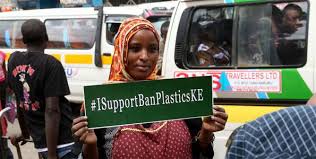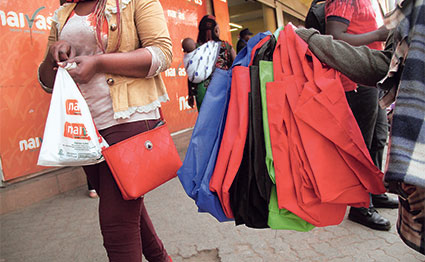KENYA: Breaks World Record with The Harshest Ban on Plastic Bags
Following the ban on the usage, manufacture, or importation of plastic bags in Kenya, which according to a new rule has taken effect this week states that offenders will be fined as much as $38,000, or serve up to four years in jail. Visitors or Citizens coming into Kenya with plastic bags will have to leave them at the airport or the borders.
Kenyan's have began adjusting to life without plastic bags starting from traders in Nairobi who have swapped the cheap lightweight plastic bags with cartons, paper bags, and envelopes to the grocery stores who are now selling reusable fiber bags and cardboard boxes.
SEE ALSO: KENYAN SELF KIDNAP: Teacher Who Demanded Ksh 500,000 was in Mombasa with another man
SEE ALSO: KENYAN SELF KIDNAP: Teacher Who Demanded Ksh 500,000 was in Mombasa with another man
Kenya’s ban on plastic bags is the world’s harshest. Punishment for carrying, manufacturing, or importing plastic bags ranges from about $19,000 to as much as $38,000 or a jail term of up to four years. Exemptions are trash bin liners, plastic bags for disposing medical waste and chemicals and plastic bags used for industrial packaging of products.
Other areas of notable interest are restaurants in Nairobi who are packaging food deliveries in spare shoe boxes and other containers. The photos of a school girl in eastern Kenya who improvised a bag made out of dried banana leaves have gone viral on social media. Residents have been mandated to dump their plastic bags at local grocery stores
SEE ALSO: SIERRA LEONE: African Football Legend Didier Drogba reacts to Sierra Leone Mudslide
SEE ALSO: SIERRA LEONE: African Football Legend Didier Drogba reacts to Sierra Leone Mudslide
The ban marks the third time officials have tried to cut down on the use of the bags in Kenya, where an estimated 100 million bags are used for packaging of customers purchased items by supermarkets every year. Previous attempts, which focused on bags of a certain level of thickness, were never fully carried out. Today, the bags litter most Kenyan roads and clog sewers and streams, damaging soil and water sources, as well as the animals that consume these plastics











Comments
Post a Comment